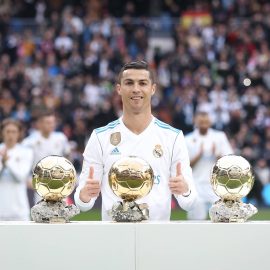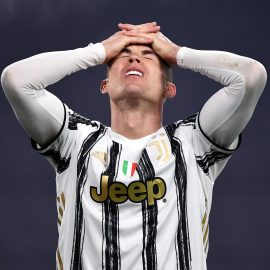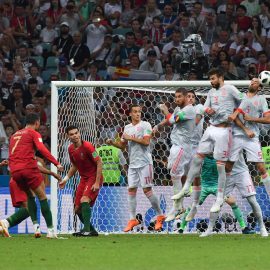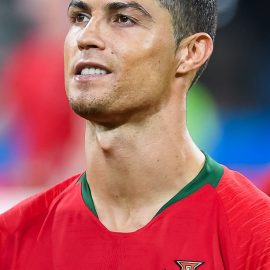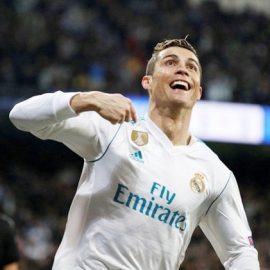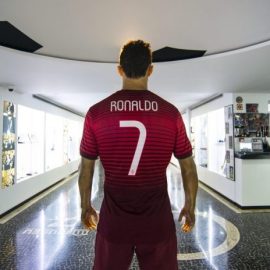Obviously, we know that Sir Alex Ferguson has won many trophies, coached a lot of great players, and accomplished a lot of extraordinary things during his time at Manchester United. His critics (namely Rafa Benitez) might point to the amount of money that he’s spent, especially in recent years, as evidence of Sir Alex Ferguson buying his way to greatness. However, it doesn’t change the fact that he’s had more than his fair share of talent at Manchester United. The sheer number of great players that have gone through Old Trafford during Sir Alex Ferguson’s reign is stunning.
Who were his very best players? Let’s look at each position:
Goalkeeper: Peter Schmeichel
Schmeichel’s stats speak for themselves. He has the highest ratio of clean-sheets to starts in Premiership history, blanking the opposition in 42% of his starts with Manchester United, Aston Villa, and Manchester City. His ratio was higher during his time at United as he managed to keep a clean sheet during 176 of his 398 starts for United in all competitions, which translated into a 45% mark. He kept 21 clean sheets in the Premiership in 1994-1995, 18 clean sheets in 1992-1993 and 1995-1996, and 16 in 1997-1998. He won the UEFA Goalkeeper of the Year award three times (1992, 1993, 1998), and the IFFHS World’s Best Goalkeeper Award twice (1992, 1993).
Schmeichel large presence in goal wasn’t limited to his impressive stats or his gigantic 6-foot 4-inch frame and XXXL shirt that made him look more like an NFL linebacker than a Premiership goalkeeper. He always seemed to come up big when his team needed him the most, whether it was saving Dennis Bergkamp’s penalty shot in the 1999 F.A. Cup Semifinals (and followed with an even better stop in extra time against Bergkamp), making a gravity-defying save against Rapid Vienna in the Champions League, or scoring an equalizer against Rotor Volgograd to salvage a UEFA Cup tie. His fiery demeanor and penchant for yelling at teammates and opponents alike ensured that his larger-than-life presence would be felt in any match, regardless of the outcome.
The “Great Dane” continues to loom large at Old Trafford as all successors and heirs have failed to measure up. Even Edwin Van der Sar, a world class keeper who recently broke the English record for most consecutive clean sheets, has been described as the “best Manchester United keeper since Schmeichel.” Maybe that will change if Van der Sar puts up a dominant performance in the Champions League Final, but right now, the edge goes to the Great Dane.
Right Back: Gary Neville
Perhaps no Manchester United player, with the possible exception of one Cristiano Ronaldo, has been more polarizing of a figure than Gary Neville. His many detractors (although he doesn’t have nearly as many as his brother, Phil, does) love to criticize him for everything, ranging from his lack of height and perceived lack of pace, to non-football related things like his outspoken nature (especially after Rio Ferdinand’s drug suspension) and his sleazy-looking moustache. Additionally, his unswerving devotion to his club has made him a lightning rod of criticism for United haters around the world, much more so than the more understated Ryan Giggs and Paul Scholes.
However, even his detractors have to admit that Gary Neville is the best English right-back of his generation and a vital cog in the United machine that has won so many trophies since Sir Alex came to Old Trafford. At his peak, he was one of the best crossers in the game and his ability to come forward made United an extremely dangerous offensive squad. Defensively, he was one of the most reliable right-backs in the world, using his knowledge of the game and his ability to position himself to make up for his athletic limitations.
As a result of injuries, his ability has diminished considerably in recent years. Nevertheless, Neville remains an inspirational leader to his club and seems destined to follow his long-time teammate, Ole Gunnar Solskjær, into the United management hierarchy. For a one-club man like Gary Neville, nothing could be more appropriate.
Center Back: Steve Bruce
There have been many great center-halves at Old Trafford since Sir Alex took the reins, and you could make a case for any number of them over Bruce and Jaap Stam (see below). Rio Ferdinand, Nemanja Vidic, and Gary Pallister have all had distinguished careers in United red, and when all is said and done, Ferdinand and Vidic may well be remembered as the two best defenders in team history. When talking about Manchester United’s greatest defenders, Bruce, the long-time captain of United, often gets forgotten about. It’s hard to see why.
After all, Bruce was widely regarded as one of the most technically gifted defenders in England during his time with United. He was an excellent passer and could hold the ball even under enormous pressure. He rarely made mistakes, which was all the more impressive given his penchant for playing hard. He was the heart of the defense and thought nothing of playing through injuries and taking punishment from opposing players. Additionally, he was an excellent goal-scorer and finished his United career with an astonishing 51 goals in all competitions (including 19 in all competitions during the 1990-1991 season), giving him a higher United tally than Denis Irwin, Louis Saha, Teddy Sheringham, and Nicky Butt.
Nowadays, Steve Bruce is probably known more for his managerial career. During stints at Birmingham City and Wigan Athletic, Bruce has been both criticized and praised, usually the former. He’s been good to his old club, though, as he has yet to win against Manchester United in a managerial capacity, including a loss on the last day of the season in 2007-2008 that allowed United to clinch the Premiership title and a loss one year later that put United on the brink of the 2008-2009 title. Clearly, those United ties are hard to cut as far as Steve Bruce is concerned.
Center Back: Jaap Stam
Sir Alex doesn’t like to admit when he’s made a mistake, especially when it comes to the transfer market. He still won’t admit that signing Juan Sebastian Veron was a mistake and he has no apologies for the personal rows that led to the likes of David Beckham, Ruud Van Nistelrooy, and Roy Keane leaving Old Trafford.
So when Sir Alex admits that he made a mistake selling Jaap Stam to Lazio in 2001, then you have to stand up and take notice. Moreover, you have to appreciate just how dominant of a center-back Stam was during his time at Old Trafford based solely on the fact that Sir Alex issued a mea culpa for his transfer. Stam was the lynch-pin of the United defense and one of the biggest reasons why they won the Treble in 1999. He was a dominant force in the air and was universally regarded as one of the best individual defenders in the world.
The exact circumstances that led to Stam’s sale remain murky. Various theories abound concerning how the star defender fell out at United so quickly and so suddenly. Some point to his controversial autobiography where Stam criticized some of his teammates (particularly the Nevilles and Beckham) and accused Sir Alex of tapping him up while he was playing for PSV Eindhoven. Others pointed to the growing influence of Jason Ferguson (Sir Alex’s son) and his agency, who were behind several of United’s moves in the transfer market (such as bringing in Roy Carroll and Laurent Blanc). Still others pointed to Stam’s failed drug test immediately after joining Lazio and speculate that United dumped Stam before he could be suspended. We don’t the exact reasons for his departure, but we know the result. Without Stam, United were forced to keep Roy Keane back in order to help out the back four, which hampered their attack and led to a memorable Keane rant about how players are treated like pieces of meat.
One thing that was indisputable was that United were worse off without Stam. It wasn’t until the squad signed Rio Ferdinand and Nemanja Vidic that they finally filled the void.
Left Back: Denis Irwin
Here’s an interesting bit of trivia. On a team that boasted so many excellent scorers and dead-ball specialists like Dwight Yorke, Andy Cole, Teddy Sheringham, Ole Gunnar Solskjær, David Beckham, Paul Scholes and Ryan Giggs, it was Denis Irwin that took the penalty kicks. His prowess from the penalty spot was one of many things that made him such an excellent player for Sir Alex Ferguson.
Irwin came to Old Trafford with little fanfare as Sir Alex purchased him for the relatively modest price of £625,000. With the low price tag came low expectations as Irwin, who had toiled for Leeds United and Oldham Athletic, wasn’t seen as a particularly dynamic player. He soon proved his worth to Manchester United as he became their most dependable and reliable defensive player. Sir Alex liked to say that he was always the first name on the lineup sheet, even ahead of the captain. An excellent defender who rarely put a wrong foot forward, Irwin continued to excel even as he got older, keeping youngsters like Phil Neville out of the first team. Meanwhile, his dead ball ability was so great that he was hailed as being a better free-kicker than Ryan Giggs, Paul Ince, and Andrei Kanchelskis. Only David Beckham was seen as a better dead-ball striker during Irwin’s time with United. Irwin could also play right-back, which only emphasizes his value to Sir Alex.
Irwin’s long period of excellence puts him ahead of his only real competition for this spot in Patrice Evra. Maybe Evra might get there after several more years of excellence. However, he’s got a ways to go, and he can thank “Mr. Dependable” for that.
Right Midfielder: Cristiano Ronaldo
Cristiano Ronaldo faced some stiff competition for this spot from none other than David Beckham. The two of them may share a love of the nightlife and a penchant for outstanding free-kicks, but that’s about it. If this were a team, then maybe Beckham would get the nod due to his outstanding crossing and brilliant passing. However, since we’re talking about the best players, then Ronaldo easily gets takes the pot.
Ronaldo’s talent is unquestionable, and his transformation from a raw, undisciplined youngster who was more style than substance into the best player in the world is a testament to Ferguson’s managerial skills. He has scored 118 goals in all competitions for United (pending the 2009 Champions League Final), including an astounding 42 goal season in 2007-2008. He’s Manchester United’s first Ballon d’Or winner since George Best in 1968. He can score them with his head, he can score then from the penalty spot, and he can score then from 35-40 yards out (as he did against Porto and Arsenal this season in the Champions League). It’s probably not a coincidence that, ever since he emerged as a bona-fide goalscoring treat in 2006-2007, United have won the Premier League every single season. Indeed, the only knocks on him are his penchant for on-the-pitch theatrics, diving, and lack of commitment to playing defense (although Beckham is certainly guilty of not tracking back as well). However, there’s no question that 99% of the managers in the world would be able to live with Ronaldo’s faults if it meant getting a player of his caliber.
The only question seems to be whether Ronaldo will continue on in a United uniform or move to Real Madrid in the offseason. Ferguson may need to rely on every bit of his persuasive skills if he wants Ronaldo to forget about his self-described “dream move.”
Center Midfielder: Roy Keane
Sometimes, the effect of skippers on their teammates is overrated. That wasn’t the case with Roy Keane. Perhaps the greatest captain in Manchester United history, Keane was a great player to boot. Keane was one of the best defensive midfielders that ever lived and his all-consuming desire to win made him an excellent leader. He was the engine of some of Sir Alex’s greatest teams and his aggressive and physical play in midfield inspired his teammates and intimidated his opponents.
It also caused him to go over the edge on numerous occasions. His disciplinary record was one of the worst in English footballing history as he was accumulated a record-tying 13 red cards during his career, with 11 coming as a United player. He admitted to injuring Alf-Inge Håland of Manchester City as retribution for a tackle in 1997-1998 that led to a serious knee injury for Keane. His dissatisfaction with Ireland’s preparations for the World Cup in 2002 led to him being dismissed by team manager Mick McCarthy. His rant on MUTV against Rio Ferdinand, Darren Fletcher, John O’Shea, Kieran Richardson, and Alan Smith was pulled from broadcast and remains one of the great “lost” interviews in football history. His row with Sir Alex over, among other things, pre-season accommodations, led to his sudden departure from United after looking like he was going to be groomed to replace Sir Alex as manager.
Nevertheless, Keane remains one of the greatest legends to ever put on a United shirt. His heroic display against Juventus in the 1999 Champions League Semifinals remains the stuff of legends while his willingness to stand up for his teammates (especially against fellow “hard-man” Patrick Vieira) only adds to his reputation. He may have flamed out, but no one burned brighter than Roy Keane did for Sir Alex Ferguson.
Center Midfielder: Bryan Robson
As successful as Sir Alex Ferguson has been over the years, its important to remember that he was hardly an overnight sensation. In fact, he went trophyless during his first three years at Old Trafford and only managed to win the 1989-1990 F.A. Cup. Despite spending on big named players like Bruce, Pallister, Mark Hughes, Paul Ince, and Neil Webb, Sir Alex never came close to winning a League Title (the closest was in 1987-1988 when he finished second by a whopping 9 points to Liverpool). He was nearly fired after his squad was humiliated against crosstown rivals Manchester City by a score of 5-1 during the 1989-1990 season. However, the board showed patience with him and he’s repaid them in spades.
The cupboard was virtually bare when Ferguson took over, but the one great player that he had was Bryan Robson, who arrived from West Brom for a then record £1.5 million (how times have changed). Robson was Manchester United’s captain for a record 12 years, but more importantly, he kept the team afloat during Ferguson’s difficult early years in charge and acted as a bridge to the club’s rise to prominence in the 1990’s. Robson gave Manchester United credibility in those days as he was one of the most respected players in England. He captained the English National Team from 1982-1991 and was widely regarded to be one of the best attacking midfielders in the world. His 99 goals in all appearances ranks 21st all time in the Manchester United record book.
Bryan Robson edges out Paul Scholes who, like Ryan Giggs and Gary Neville, have been loyal one-club servants under Sir Alex. While both players have their merits, Robson played with lesser teammates and carried his squad while Scholes was always more of a complimentary player. Robson continues to serve his club to this day, returning to Manchester United to serve as a goodwill ambassador alongside fellow legend, Sir Bobby Charlton.
Left Midfielder: Ryan Giggs
Here’s some food for thought. There has never been a Premiership season in which Ryan Giggs did not score at least one goal for Manchester United. He is also the first player in UEFA Champions League history to score in 12 consecutive seasons. Most importantly, Ryan Giggs has won more English League Titles than any other footballer in history and is the only Manchester United player to have played for each and every one of the 11 Premier League championship teams under Sir Alex Ferguson.
More impressively, Giggs has seemingly gotten better with age. He started out as a dynamic left winger who was known for his dazzling runs down the flanks and his deft scoring touch. If you ever needed confirmation of his blinding speed, his excellent dribbling, and his astounding scoring touch, one need only ask Arsene Wenger about it, and he’ll recount to you the 1999 F.A. Cup Semifinals where Ryan Giggs carved up his entire defense and put the past one of the best shot-stoppers in the world in David Seaman (assuming Wenger saw it, of course). As he got older, and his lost a bit of his speed, Giggs was able to reinvent himself as a playmaking central midfielder who used his deft passing skills and outstanding vision to set up his teammates. Even though he became more of a facilitator, he was still capable of scoring the occasional highlight reel goal. Just ask Blackburn about Giggs’ scoring touch and they’ll tell you about this past season when he faked out two defenders and put one past a stunned Paul Robinson.
Simply put, many players have come and gone, but Giggs has always been a constant and important presence at Old Trafford. Sir Alex Ferguson doesn’t know what it’s like to win a Premiership crown without Giggs, and he probably doesn’t want to find out anytime soon.
Forward: Ruud Van Nistelrooy
Maybe the best pure scorer Sir Alex Ferguson ever had, Ruud Van Nistelrooy was a certifiable goal machine. His stats are jaw dropping: 150 goals in 219 starts in all competitions for United. 95 Premiership goals in only 5 seasons (which included an injury-plagued 2004-2005 season where he only made 17 league appearances). 44 goals in all competitions in 2002-2003, which is the second-highest mark in team history. He scored a United-record 38 goals in 47 appearances in Europe, and his all-time mark of 60 goals is second-best behind Real Madrid’s Raul. Despite only playing 219 times for United, he is eighth on their all-time scoring list. Out the club’s top ten scorers of all time, Van Nistelrooy has the fewest appearances by 74 matches.
Van Nistelrooy’s United career was almost over before it began as a serious knee injury derailed his transfer from PSV in 2000. However, he recovered and Sir Alex Ferguson stuck to his gut and brought the Dutch hitman to Old Trafford the following season whereupon he established himself as one of the best target men in the world. As opposed to previous seasons where Sir Alex relied on duos, trios, or even quartets of forwards, Van Nistelrooy thrived no matter what the situation was and always produced, even when his teammates weren’t pulling their weight. It seemed as if Van Nistelrooy was destined to spend his career at Old Trafford, eventually breaking Sir Bobby Charlton’s goalscoring mark.
However, it wasn’t to be. A training camp bust-up with Cristiano Ronaldo, a controversial statement over how the team missed David Beckham, and several personality clashes with Sir Alex over team selection and tactics ensured that Van Nistelrooy’s United career would end badly. After the 2005-2006 season, Van Nistelrooy went to Real Madrid for a fraction of what Sir Alex had paid for him in 2001. Nevertheless, his inglorious end doesn’t detract from his accomplishments, and Van Nistelrooy can rightly claim to be one of the greatest strikers in team history.
Forward: Eric Cantona
The King was voted United’s “Player of the Century”and it’s hard to argue with the choice. The wildly popular French import keyed a turnaround in Manchester United’s (and Sir Alex Ferguson’s) fortunes after he arrived from hated rivals Leeds United in 1992. In fact, you can draw an imaginary line and analyze Manchester United’s accomplishments Before Cantona and After Cantona, and the disparity is striking. Before King Eric arrived to Old Trafford, Sir Alex Ferguson’s United squad won one F.A. Cup (1989-1990), one League Cup (1991-1992), and one Cup Winner’s Cup (1990-1991 – although English clubs were banned from European play as a result of the Heysel Stadium Disaster). After Cantona arrived, they won 11 league titles, 4 F.A. Cups, 2 League Cups, 2 Champions League crowns (pending the 2009 Finals), and 1 FIFA Club World Cup.
Surely, Cantona wasn’t the sole reason for the turnaround. In fact he retired in 1997 and missed out on a majority of those “After Cantona” trophies. However, Cantona carried the team and was the squad’s talismanic figure during what should have been transitional years for Manchester United as the old guard of Steve Bruce, Gary Pallister, Mark Hughes, Lee Sharpe, and others were being phased out in favor of youngsters like Ryan Giggs, David Beckham, Paul Scholes, Nicky Butt, and Gary and Phil Neville. Instead, United persevered and Cantona won four Premiership crowns and two F.A. Cups. Along the way, he scored 82 goals in 185 total appearances for United.
Cantona’s skills and ability to create goals out of thin air made him a constant danger to score and nowhere was this more obvious than during the 1996 F.A. Cup Final against the Cream Suit Brigade of Liverpool. In the 85th minute of a scoreless game, David James punched a corner kick out to the edge of the penalty area where Cantona happened to be standing. The United skipper reared back and fired a shot past a helpless James to win the F.A. Cup for his squad. After the match, a classy Cantona even offered to let regular captain Steve Bruce, who missed the game due to injury, lift the trophy.
Much like with Roy Keane, Cantona’s disciplinary problems and his emotional outbursts overshadowed many of his on-field accomplishments. While many might remember his mixed-martial arts demonstration against a Crystal Palace fan, most United fans will remember him, instead, for his heroics on the pitch.
Add Sportslens to your Google News Feed!

